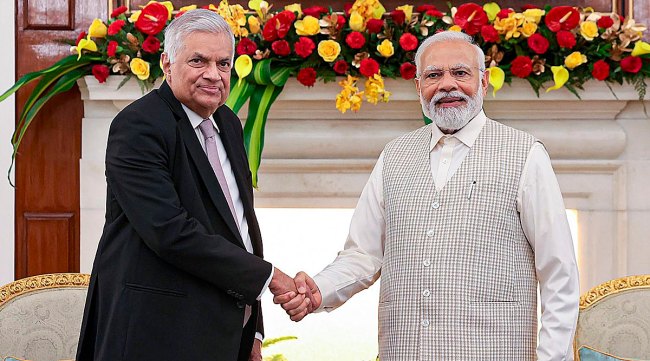Opinion President Wickremesinghe in India: A ready answer to the Tamil question
New Delhi has long believed that implementation of the 13th Amendment to Sri Lanka's constitution – which guarantees some devolution of powers to Tamil regions – will go a long way in addressing ethnic tensions. Currently, India has some leverage on the issue
 Prime Minister Narendra Modi during a meeting with President of Sri Lanka Ranil Wickremesinghe at Hyderabad House, in New Delhi. (PTI)
Prime Minister Narendra Modi during a meeting with President of Sri Lanka Ranil Wickremesinghe at Hyderabad House, in New Delhi. (PTI) After much prevarication, Ranil Wickremesinghe is on his first visit to India for two days on his first visit as president on July 21 since he assumed the presidency last year. This is three days before the aggrieved Sri Lankan Tamil community will observe the 40th anniversary of Black July. The visit entails agreements and talks on Indian projects in Sri Lanka in fields like energy, maritime and agriculture. Though Prime Minister Narendra Modi and External Affairs Minister S Jaishankar have been vocal about it in the past, one issue that has not received media attention so far is that of the 13th Amendment to the Constitution of Sri Lanka.
What is the 13th Amendment?
In 1987, President Junius Richard Jayewardene and Prime Minister Rajiv Gandhi signed a treaty — the Indo-Sri Lanka Peace Accord — in return for India’s support in mediating and establishing peace between Tamil insurgent groups and the Sri Lankan state. Under this treaty, Sri Lanka was required to implement devolution of power to the provinces, a merger — subject to later referendum — of the Northern and the Eastern provinces into a single province, and official status for the Tamil language, in exchange for a peace-keeping mission. India fulfilled its promise by committing 1,00,000 soldiers and incurring a loss of more than a thousand lives, including the life of a former Indian Prime Minister (Rajiv Gandhi).
In order to implement this treaty, the Sri Lankan parliament amended its constitution and enacted the 13th Amendment. The amendment created provincial councils in Sri Lanka and designated both Sinhalese and Tamil as national languages. Particularly aimed at the devolution of powers regarding agriculture, housing, police and land, the amendment granted provincial governments some autonomy within the unitary structure of Sri Lanka.
India has had a deep concern for the Tamil issue in Sri Lanka due to the umbilical bond between the (Tamil) people of the two countries. The issue is hardly an internal matter anymore. Since India has to deal with refugees every month from Northern Sri Lanka, it is not only an international issue but one in which India has stakes. India has, since the treaty’s enactment and throughout the civil war, been constantly emphasising that the implementation of the amendment’s provisions would significantly improve the ethnic relations in the island state. Under the current regime, Prime Minister Modi on his visit to Sri Lanka in 2015 — also his first one to Jaffna — urged the state to “fully” implement the amendment and even suggested going beyond to ensure the reconciliation and interests of the Tamil people.
Wickremesinghe is seen as having a relatively favourable stance on both the Tamil issue and bilateral relations with India. Last year, he made a pledge to resolve the ethnic question in Sri Lanka by February 4 this year, when Sri Lanka celebrated its 75th Independence Day. He failed to do so. In January, on the occasion of Pongal, he made a speech citing “hope” to implement the 13th Amendment, in the Tamil north as well as the Sinhala south. In May this year, he reiterated his commitment and added that he intends to resolve the conflict by the year’s end though without any mention of the amendment’s implementation.
However, in May, the latest round of talks between the government and the TNA (Tamil National Alliance) yielded no results with Tamil leaders alleging these were just tactics to delay the needful and deceive the international community in order to secure IMF loans and economic aid. Whether Wickramsinghe is delaying reconciliation deliberately and just orchestrating the talks to window-dress his real intentions or not, it is clear that he is not close to fulfilling his promise before the end of this year.
The Sri Lankan president is currently facing an economic crisis, the worst since the independence of his country. He looks determined to bring the country out of the depression it is in at the moment. After a bailout from IMF and aid worth $3.9 billion from India, Sri Lanka is under diplomatic pressure to clean its record of subjugation of the Tamil people.
Wickremesinghe still needs favours to resolve the ongoing crisis. He has expressed his desire to upgrade the free-trade agreement with India. During this visit too, he expects to bolster economic cooperation between the two countries, especially in the field of energy. A few days ago, Colombo concluded the 67th convention of the Travel Agents Association of India, in a bid to further boost its foreign exchange reserves from Indian tourist arrivals in the coming years. Therefore, India is currently in an excellent position to leverage the situation and make Sri Lanka fulfil its obligations to its Tamil community.
As PM Modi has indicated on multiple occasions, India will not back away from its stand on the safety and welfare of the Tamil community of Sri Lanka. Hence, apart from security, this issue is a major concern in India’s bilateral ties with Sri Lanka. EAM Jaishankar, in March, emphasised that “blood is thicker than water” in the context of Sri Lanka. India has acted upon it by advancing loans and other aid to its ancient neighbour since it started grappling with the damning crisis in 2021. It is part of India’s ‘Neighbourhood First Policy’. Now it is incumbent on Sri Lanka to respond with the same spirit.
The writer is Assistant Professor of Diplomacy, JNU






